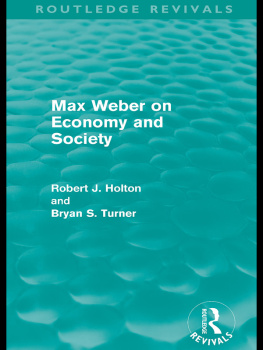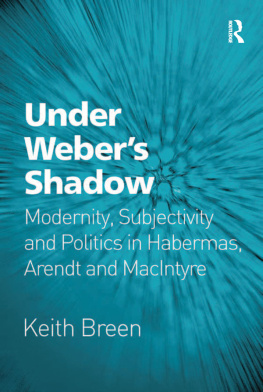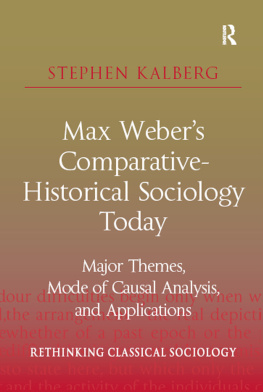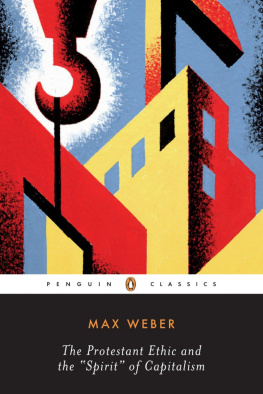MAX WEBER ON ECONOMY AND SOCIETY
Max Webers work endures as an indispensable source for understanding modern societies. This book outlines the key concerns of Webers sociology with its focus on law, religion, politics, and economic life. The authors draw on their longstanding interest and expertise in Webers sociology to give a critical reassessment of Weberian sociology based on the most recent research findings.
Robert J.Holton and Bryan S.Turner point to the productive legacy of Webers thought in current areas of intellectual debate, notably the secularization and rationalization of global cultures, the crisis of Marxism, the rise of the New Right, and the emergence of post-modernism. They defend a version of social liberalism against both left and right-wing criticism via an analysis of Webers position in the sociological tradition.
Wide-ranging and authoritative, Max Weber on Economy and Society is not only a major reassessment of the contemporary significance of Webers social theory, but also a broad perspective for the analysis of social questions.
Robert J.Holton and Bryan S.Turner have produced a marvellous book analysing both the contribution of Max Weber to our theory of modernity and the comeback of Liberalism as a viable ideological and social system.
Dr Ronald M.Glassman,
William Paterson College, New Jersey
MAX WEBER ON ECONOMY AND SOCIETY
ROBERT J.HOLTON
and
BRYAN S.TURNER

London and New York
First published in 1989 by Routledge
This edition published in the Taylor & Francis e-Library, 2010.
To purchase your own copy of this or any of Taylor & Francis or Routledges collection of thousands of eBooks please go to www.eBookstore.tandf.co.uk.
Reprinted in paperback in 1990 by Routledge
11 New Fetter Lane, London EC4P 4EE
29 West 35th Street, New York, NY 10001
1989 Robert J.Holton and Bryan S.Turner
All rights reserved. No part of this book may be reprinted
or reproduced or utilized in any form or by any electronic,
mechanical, or other means, now known or hereafter
invented, including photocopying and recording, or in any
information storage or retrieval system, without permission
in writing from the publishers.
British Library Cataloguing in Publication Data
Holton, R.J. (Robert John), 1946
Max Weber on economy and society.
1. Sociology. Theories of Weber, Max
I. Title. II. Turner, Bryan, S. (Bryan Stanley), 1945
301.0924
Library of Congress Cataloging in Publication Data
Holton, R.J.
Max Weber on economy and society
Robert J.Holton and Bryan S.Turner
p. cm. Bibliography: p. Includes index.
Weber, Max. 18641920. 2. SociologyGermanyHistory
I. Turner, Bryan S. II. Title.
HM22.G3W4435 1989 301.0943dc 19 8830646 CIP
ISBN 0-203-83163-2 Master e-book ISBN
ISBN 0-415-05433-8
CONTENTS
ACKNOWLEDGEMENTS
The chapters by Bryan Turner were completed at the University of Bielefeld (West Germany) where he was guest professor in the Faculty of Social Science in 19878. The period of study was made possible by the Alexander von Humboldt Foundation, which was generous in its research support.
Earlier versions of Chapters were delivered by Robert Holton and Bryan Turner respectively at the Max Weber Colloquium held at the William Paterson College of New Jersey in 1986. We are grateful to Professor Ron Glassman for organizing this important gathering of Weber scholars.
A version of was given by Bryan Turner at Bielefeld University and St Maartens, French West Indies, in 1987. We are grateful to Roland Robertson for criticism of an earlier version.
was a conference paper at the Law and History Conference held in Melbourne, Australia, in 1986.
A number of arguments in were outlined in a paper given to the Sociology of Consumption Conference at the University of Oslo in 1988. Robert Holton is particularly grateful to Peter Saunders and Bert Moorhouse for helping to clarify many issues pertinent to this paper.
Chapters were finally assembled in 1988 in the Algemene Sociale Wetenschappen, Rijksuniversiteit te Utrecht. Bryan Turner would like to thank the staff at Utrecht for their support, especially Professor Hans Adriaansens.
We should also like to thank Sue Manser and Ina Cooper for their assistance in turning our often confused manuscripts into final copy.
Robert Holton
Bryan Turner
INTRODUCTION
There is a definite revival of liberalism under way within western thought. This revival is in one sense rather surprising since much academic opinion had supposed liberalism to be in retreat if not vanquished and discredited. Political economy, it seemed, had been intellectually if not institutionally triumphant over neo-classical economics, critical legal studies were taken to have undermined the liberal theory of law, while Marxism had demolished liberal-democratic political theory, and Frankfurt School critical theory had rendered obsolete Enlightenment notions of liberal rationalism, and exposed the shallow repressiveness of consumer society, leaving radical sociology for its part to destroy the theoretical pretension of liberal Parsonian sociology. While liberalism remained institutionally entrenched in many of the core institutions of academia, its ideologues could be regarded for the most part as a discredited and largely atavistic bunch of cold-war warriors living out a curious sort of decaying intellectual half-life on the margins of intellectual progress. From todays viewpoint, however, this set of putative victories seems increasingly precarious and in some cases illusory.
There are a number of indicators of the scope of the liberal revival. In the first place, many of the influential stars in the post-war Marxist firmament such as Althusser and Poulantzas, Lukcs and Gramsci, are on the wane, while names like J.S.Mill, T.H.Marshall, Talcott Parsons, and Robert Dahl are increasingly to be found as intellectual reference points. Second, many of the weaknesses and residual problems in political economy, critical theory, and Marxism have by now achieved an intolerable scale, prompting interest in alternative social-theoretical paradigms. Many of these difficulties stem from the growing realization that the period from 1950 to 1986 has been characterized not by a crisis of capitalism, but by a crisis of communism and those forms of socialism based on a Gemeinschaft model of social organization. Many of the critical positions advanced against the liberal world-view effectively asserted the superiority of Gemeinschaft over Gesellschaft. This superiority was claimed by asserting the merits of community over individualism, public collectivism over private self-interest, and an organic theory of political participation and consent over representative democracy and individual citizenship rights.
It now seems that Gemeinschaft is dead in the western world and world communist movement, though not within the resurgent Islamic world. Crises of communism as a system of government are reflected in economic mismanagement and the inability to satisfy consumer demands on the one hand, and in political repression and totalitarianism on the other. The difficulties of economic planning by command mechanisms are reflected in the shift of some eastern European societies like Hungary, and more recently China, towards a greater element of market-based resource allocation. This in turn has engendered a loss of confidence in many circles in social planning strategies based solely on state initiative. The overall record of communist societies has helped to erode any a priori claims as to the moral superiority of communism over capitalism and liberal individualism that once may have existed.







